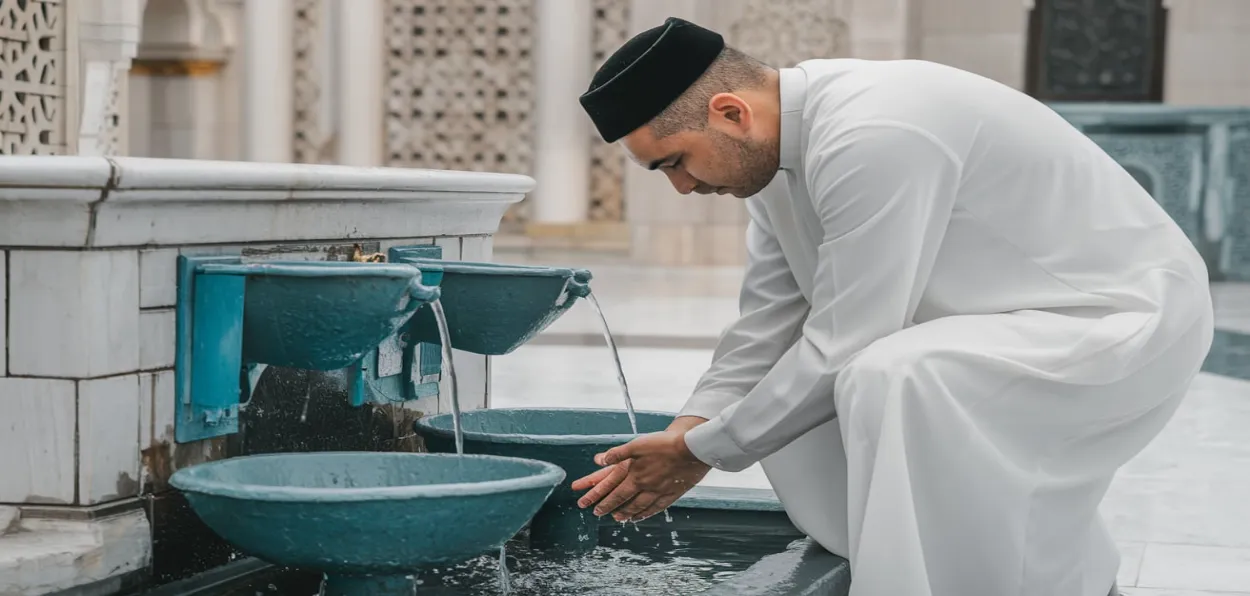
Eman Sakina
In Islam, Ghusl refers to the full-body ritual purification required in certain circumstances, such as after major impurities or before specific religious practices. The act of Ghusl is mentioned in the Quran, and it is essential for achieving ritual cleanliness. There are different types of Ghusls depending on the situation.
Friday Musings
Below is an overview of the differenttypesof ghusls in Islam:
Ghusl Janabah (Major Impurity)
This type of Ghusl is performed after engaging in sexual activity or any act that causes the discharge of semen, for both men and women. Janabah refers to the state of major ritual impurity, and Ghusl is obligatory to cleanse the body for performing daily prayers (Salat) and other acts of worship.
Wash the hands, private parts, and any areas that may have been contaminated. Then, Wudu (ablution) is performed, and the entire body is washed, including the hair, without leaving any part dry.
Ghusl Haid (Menstrual Period)
After a woman’s menstrual cycle ends, she must perform Ghusl before she can resume religious duties such as prayer and fasting. This Ghusl purifies her from the state of major impurity caused by menstruation.
It's smilarto Ghusl Janabah, the entire body must be washed ensuring no part is left dry. It's preferable to use water mixed with something fragrant for additional cleanliness.
Ghusl Nifas(Postpartum Bleeding)
After childbirth, women undergo a period known as Nifas, during which they are not required to pray or fast. Once this bleeding stops, they must perform Ghusl before resuming religious practices. This usually occurs after about 40 days, but it can vary.
Like Ghusl Haid, it involves thoroughly washing the entire body to cleanse oneself from major impurities.
Ghusl for Conversion to Islam
When someone converts to Islam, they are advised to perform Ghusl as part of their transition into the faith. This Ghusl is not due to impurity, but rather a symbolic purification and a fresh start in the faith.
The procedure follows the same steps as any other Ghusl: intention (Niyyah), washing the entire body, and ensuring that no part remains dry.
Ghusl for the Deceased
Before a deceased Muslim is buried, their body must be given a ritual washing. This is a communal obligation (Fard Kifayah) upon the Muslim community. The body is gently washed by close family members or designated individuals while maintaining modesty and care.
Ghusl Mayyit (After Washing a Dead Body)
According to Islamic tradition, those who participate in washing the body of a deceased Muslim must perform ghusl afterward. This is done to purify oneself after handling the body, as itis considered an act of great merit in Islam.
Ghusl for Jummah (Friday Prayers)
It is highly recommended (sunnah) to performghusl before attending the Friday congregational prayers (Jummah).Although it isnot obligatory, it is a sunnah of the Prophet Muhammad and is meant to ensure cleanliness and freshness when gathering with fellow worshippers.
Ghusl for Eid (Eid al-Fitr and Eid al-Adha)
It is also recommended to performghusl on the mornings of Eid al-Fitr and Eid al-Adha before going out to perform the Eid prayers.This act is considereda way to purify oneself and prepare for the joyous worship associated with these special days.
Steps for Performing Ghusl
While the intention (niyyah) for ghusl may vary based on the type of ghusl being performed, the general procedure is as follows:
Niyyah(Intention): Start with the intention of performing ghusl to purify yourself for a specific purpose.
Wash your hands three times to begin. Clean the private parts thoroughly, especially if performing Ghusl Janabah.
Wudu (Ablution): Perform the regular wudu (ablution) as you would before prayer.
Pour water over head three times, ensuring that thewater reaches the scalp.
Wash the entire body, starting with the right side, then the left side, ensuring that no part of the bodyis left dry.
ALSO READ: Pioneer of India's street art movement Hanif Kureshi is no more
Ghusl plays a crucial role in maintaining bothspiritual and physical purity in Islam. Each type of ghusl serves a unique purpose, from purification after major ritual impurities to recommended practices before special prayers and occasions. Understanding when and how to perform ghusl helps Muslims maintain the cleanliness that isemphasized in their daily acts of worship.
